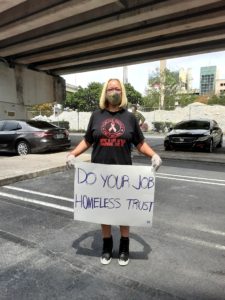
Alecia sporting her B.I.T.C.H. shirt: Beautiful, Intelligent, Talented Chick with HIV/AIDS.
Our May 2020 Shero of the Month is Alecia Tramel of Miami, Florida. Alecia is a mother, grandmother, community activist, HIV advocate, as well as PWN’s Florida State Lead. She is the founder of Positive People Network, Inc., a social organization for people living with HIV and AIDS that provides opportunities for social support, outings, and direct support for people in need. “Alecia is a powerhouse here in Miami and nationally,” said Jennie Smith-Camejo, communications director for PWN. “From providing direct support on the ground to people experiencing homelessness, to fundraising to support people living with HIV having trouble making ends meet, to organizing her community to pass Amendment 4 restoring voting rights to people with felony convictions, to participating in the Florida HIV Justice Coalition, working to reform the state’s HIV criminalization laws, she never stops working to help her community and is involved in everything! It’s amazing how much she is able to accomplish with only 24 hours in a day.”
Alecia founded Positive People Network, Inc. (PPN), which celebrates its one-year anniversary as a registered 501(c)3 nonprofit organization this month, when she identified a gap in social support for people living with HIV. “I was at a conference and heard all of the wonderful advocates speaking on all of the great ideas and dreams for our community, but no support,” she said. “We all work for organizations but want to be able to do more than the 9 to 5. Because we are living with this condition, the clock doesn’t end at 5 pm. It’s 24 hours a day, 7 days a week, 365 days a year.” PPN’s motto is, “There’s life after diagnosis. Live it.”
“We have directors in Missouri (Kneeshe Parkinson), Las Vegas (Connie Shearer), Virginia (Deirdre Johnson), Indiana (Michelle Harris), Miami, Florida Youth Director (Gena Grant) and Ft. Lauderdale, Florida (Melvin Wright),” she noted. “PPN is inclusive of everyone. We have PPN TransParent, PPN Men, PPN LGBTQ, and PPN Youth. No one is left behind!”
One of PPN’s projects is a mutual aid fund called My Sister’s Keeper, which has assisted women with electric bills, food, transportation and a mortgage payment. During COVID-19, PPN has been hosting a virtual karaoke party on Saturdays and a Wellness Resource Wednesday event to keep people engaged and to give them a place to relax and release. Alecia has a long history of working to help people experiencing homelessness. For her, it’s personal. She explained, “I was homeless during my pregnancy with my 17-year-old son, and I know this struggle firsthand. The best way to show appreciation for coming out of a situation for me is to give back to others who are in the place where you were. In 2016, I acquired a food pantry called Stop Hunger, Inc. My family and I would go out every Saturday and support the homeless community by taking sandwiches, cold water, fruit, and a sweet treat. During COVID-19, a couple of friends and I decided to go out and show support and love to the homeless community for Easter. We were the only people who went out that day, and the welcomed reception was so amazing and needed, we decided to make it a monthly event. We sent out a call on Facebook for donations and we received a few donations that allowed us to purchase water, chips, cookies, and we made sandwiches. We also collected and distributed clothes. The community loved it. Due to the uncertainty of people with homes, we had to be there for the most vulnerable in our community.
Alecia has a long history of working to help people experiencing homelessness. For her, it’s personal. She explained, “I was homeless during my pregnancy with my 17-year-old son, and I know this struggle firsthand. The best way to show appreciation for coming out of a situation for me is to give back to others who are in the place where you were. In 2016, I acquired a food pantry called Stop Hunger, Inc. My family and I would go out every Saturday and support the homeless community by taking sandwiches, cold water, fruit, and a sweet treat. During COVID-19, a couple of friends and I decided to go out and show support and love to the homeless community for Easter. We were the only people who went out that day, and the welcomed reception was so amazing and needed, we decided to make it a monthly event. We sent out a call on Facebook for donations and we received a few donations that allowed us to purchase water, chips, cookies, and we made sandwiches. We also collected and distributed clothes. The community loved it. Due to the uncertainty of people with homes, we had to be there for the most vulnerable in our community.
“Instead of just looking and not seeing, we decided to pay attention. It doesn’t take much to be a ray of light to someone who is less fortunate. Just show up. We are all on a fixed income and don’t know where our next dollar is coming from, but when we come together, we make things happen.”
Alecia definitely knows how to make things happen. Recently, when she went for a much-needed massage, her plan of enjoying some pampering turned into the dreaded nightmare of stigma and discrimination that prevents so many from being open about their HIV status. “In all of my 20 years of being an advocate and encountering people with prejudices, I have never taken it personally,” she said. “When I disclosed to the woman who was going to do my massage, I could sense the fear, and when she told me that I would need a doctor’s note giving me permission to get a massage, I was devastated. Could this be happening to me? In that moment, I felt the hurt and shame for myself and all of my friends. It was so overwhelming I had a lump in my throat and tears in my eyes. I’m a strong woman and try to never let anything get to me, but this got to me and scared me. I felt like I did when I was first diagnosed, and this concerned me. Once I got over the initial shock, I was angry. Angry that I was being turned away from a massage that I really was looking forward to. I was stressed and ready to be pampered. I felt that this was wrong that this happened to me and knew I needed to do something about it. I contacted a lawyer and found out that it was discrimination and that is illegal, and so filed the lawsuit. For me, it was about advocacy to help end the stigmas associated with HIV and AIDS. It was an opportunity to educate the community on methods of transmission. It was to make sure that this didn’t happen to anyone else.”
She won and settled out of court. She got what she was hoping for–not to get rich, but to change the policy and procedures of all Massage Envy franchises around the world with regards to HIV and AIDS to make sure that nobody else had to go through the same experience.
Besides the hard work that goes into starting up a nonprofit organization, showing up for the community, and advocating for justice, there are still more challenges–especially securing funding to do the work. “The extent of your reach is determined by ability to perform. We’re not able to apply for grants because we are new and haven’t had financial audits. We are grassroots and doing the work, but the money always goes to the established big boys. We need a system that allows for the little guys to get the opportunity to show that we have value.”
Alecia said that is not true just for organizations, but also for individuals doing the work. “We also need to value the advocates that are doing the work. When we show up and tell our stories and re-traumatize ourselves, just giving us a thank you is not okay. We have firsthand information from living with this virus day in and day out. Our experience is more valuable than reading it from a book. Personal experience should be a job title that has a starting pay of $50,000.00 a year. Many of us who are out don’t even have a savings nest egg for when we get sick.”
People who would like to support the work of Positive People Network can donate here.


